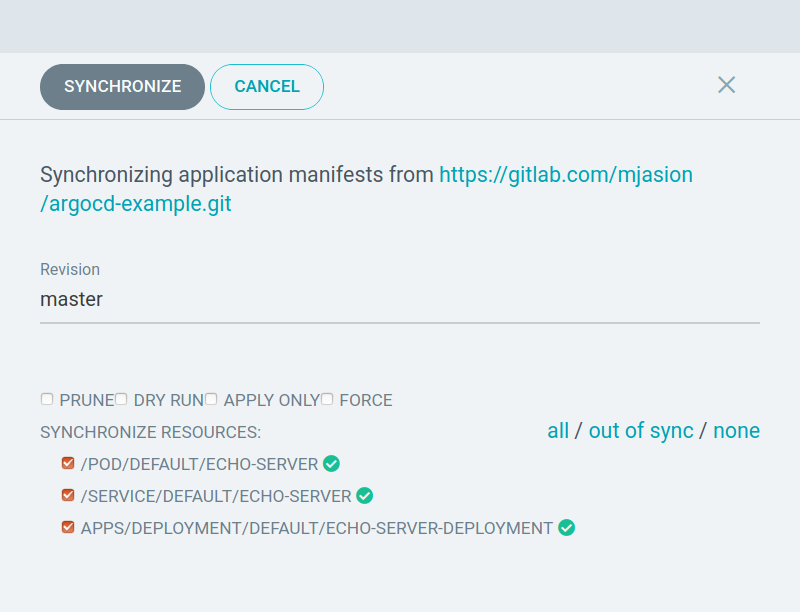GitOps
Czyli konfigurowanie Kubernetesa Gitem
SysOps/DevOps Warszawa MeetUp #48 - 27.02.2020
Agenda
- How we manage Kubernetes today?
- GitOps - solution for daily problems with managing on K8s
- Swiss army knife - ArgoCD
- Istio deployment in 90 seconds
- Failure stories
Marcin_Jasion.json
Senior SRE @
How we manage Kubernetes today?
Command line
This is Manual
- Human as a source of truth
- Possible situation, when two developers are applying the same object - communication needed
- Hard to figure out diffs
Failure story #1: YAML Overriding
Other problems
- Assume now K8S as objects store(like records in database). And we store object definitions in Git.
So when we delete file from Git... not everyone remembers to delete the object.
- Hard to compare changes before apply.
- Even when we try to commit changes before apply, often we forget to push the code.
Ok. those are problems
Are there better options?
Yes
But first let's determine our needs.
The entire system is described declaratively
- Configuration is guaranteed by a set of facts instead of by a set of instructions.
- Cluster can be easily reproduced(e.g. business recovery tests; site clone).
- Reduced meantime to recovery(MTTR).
System state is versioned in Git
Changelog and rollbacks are easy
git loggit revert
Access to the repository may be restricted to a small group of people.
Changes in state are automatically applied to the system
- Creating, modifying or deleting objects are automatically applied on cluster.
- Why? To increase consistency and standardization of our pipelines.
Operator ensure correctness and alert on divergence
Cluster state is restored to latest revision automatically.
That was Four principles of GitOps
The practical guide to GitOps from Weaveworks
When can I use GitOps?
To deploy core services in your cluster
- Ingress controllers: Nginx, Envoy.
- Service Mesh with configuration: Istio, Consul Connect.
- Logging processors: Fluentbit, Filebeat.
- Cluster tools: kube-state-metrics.
- Other: HPA, Operators, Chaos monkey and much more.
To provide base configuration to all of those services
Maybe I am doing GitOps? I have CI/CD pipelines

Yes...
- They are automated
- And state is applied from Git repository
... but what about deleting the objects?
This is not easy:
- How to track previously created objects?
- What if I have to use different templating tools?
And how to regulary restore the state on cluster?
The pipeline has to be scheduled regularly.
But how to check which object is out of sync with the state?
Example: one of Deployments is misconfigured
ArgoCD

What can be configured
- Repository URL
- Reference: branch/tag/hash
- Synchronization policy
- Manual
- Automatic
- Path in repository
- Recursive - To follow directories recursively
- Namespace, where objects are applied(if namespaced)
Demo
Let's deploy first application
tree demo_1/
demo_1/
├── deployment.yaml
├── pod.yaml
└── service.yaml
0 directories, 3 files
Not only UI
spec: source: path: demo_1/ repoURL: 'https://gitlab.com/mjasion/argocd-example.git' targetRevision: master directory: recurse: true destination: namespace: default server: 'https://kubernetes.default.svc' project: default syncPolicy: automated: prune: true selfHeal: true apiVersion: argoproj.io/v1alpha1 kind: Application metadata: name: demo1
spec: source: path: demo_1/ repoURL: 'https://gitlab.com/mjasion/argocd-example.git' targetRevision: master directory: recurse: true destination: namespace: default server: 'https://kubernetes.default.svc' project: default syncPolicy: automated: prune: true selfHeal: true apiVersion: argoproj.io/v1alpha1 kind: Application metadata: name: demo1
spec: source: path: demo_1/ repoURL: 'https://gitlab.com/mjasion/argocd-example.git' targetRevision: master directory: recurse: true destination: namespace: default server: 'https://kubernetes.default.svc' project: default syncPolicy: automated: prune: true selfHeal: true apiVersion: argoproj.io/v1alpha1 kind: Application metadata: name: demo1
Synchronization policies
- Manual
- Automatic
- (Optional) With resource pruning
- (Optional) With self healing
Application Panel

Refresh
Compare the latest code in Git with the live state. Figure out what is different.
Sync
The process of making an application move to its target state. E.g. by applying changes to a Kubernetes cluster.
Demo
Application is out of sync
Auto-heal is disabled
Demo
Something is out of sync
Let's figure out the differences with state
Sync options

Let's remove something!
Ok, but what about security

Required priviledges
| CI Tool | GitOps Tool | |
|---|---|---|
| Cluster | Outside | Inside |
| Code Repository | Read/Write | Read |
| Container Repository | Read/Write | Read |
ArgoCD needs ClusterAdmin permission
RBAC is designed to define allow rules
But this ClusterAdmin can sometimes save your ass :-)
Failure #2: EKS Authentication Configuration
In EKS there is and aws-auth ConfigMap
aws-auth is to map IAM users to K8S users
And add proper permissions
data: mapUsers: | - "groups": - "system:masters" # <---- THIS "userarn": "arn:aws:iam::xxx:user/marcin" "username": "marcin" - "groups": - "system:authenticated" # <---- THIS "userarn": "arn:aws:iam::xxx:user/other" "username": "other"
data: mapUsers: | - "groups": - "system:masters" # <---- THIS "userarn": "arn:aws:iam::xxx:user/marcin" "username": "marcin" - "groups": - "system:authenticated" # <---- THIS "userarn": "arn:aws:iam::xxx:user/other" "username": "other"
But Somethimes, when you are doing code refactor
You can not notice the issue...
data: mapUsers: | - "groups": - "system:masters" "userarn": "arn:aws:iam::xxx:user/marcin" "username": "marcin" - "groups": - "system:authenticated" "userarn": "arn:aws:iam::xxx:user/marcin" "username": "marcin"
data: mapUsers: | - "groups": - "system:masters" "userarn": "arn:aws:iam::xxx:user/marcin" "username": "marcin" - "groups": - "system:authenticated" "userarn": "arn:aws:iam::xxx:user/marcin" "username": "marcin"
data: mapUsers: | - "groups": - "system:masters" "userarn": "arn:aws:iam::xxx:user/marcin" "username": "marcin" - "groups": - "system:authenticated" "userarn": "arn:aws:iam::xxx:user/marcin" "username": "marcin"
... and then you are not admin of your cluster 😎
ArgoCD supports templating tools
- Plain directory of YAML/json manifests
- helm charts
- kustomize applications
- ksonnet applications
- jsonnet files
- Custom tools(developing own plugin is required)
Be aware
It is not possible to configure dependencies between Applications

How to install?
$ kubectl create namespace argocd $ kubectl apply -n argocd \ -f https://raw.githubusercontent.com/argoproj/argo-cd/stable/manifests/install.yml $ kubectl patch svc argocd-server -n argocd \ -p '{"spec": {"type": "LoadBalancer"}}'

Nope
apiVersion: argoproj.io/v1alpha1 kind: Application metadata: namespace: argocd name: argo-root spec: source: path: applications/ repoURL: 'https://gitlab.com/mjasion/argocd-example.git' targetRevision: master directory: recurse: true destination: namespace: argocd server: 'https://kubernetes.default.svc' project: default syncPolicy: automated: prune: true selfHeal: true
Why it is helpful?
To reduce recovery procedure.
To have all things in repository.
Cluster recreation becomes simple!
- Deploy K8S Cluster
- Install ArgoCD
- Deploy
argo-root Applicationwhich manages otherApplicationdefinitions - WIN WIN WIN
Time to real deployment
Istio in 90 seconds

Istio CRD
kind: Application metadata: name: istio-crd spec: destination: namespace: istio-system server: 'https://kubernetes.default.svc' source: path: istio_helm/istio-init ...
Istio
kind: Application metadata: name: istio spec: source: path: istio_helm/istio repoURL: 'https://gitlab.com/mjasion/argocd-example.git' targetRevision: master helm: valueFiles: - values-istio-demo.yaml destination: namespace: istio-system ...
Usful tips
- Store plain YAML's in single repository.
- Separate them by folders(by namespaces).
- Put other applications in separate repositories.
What to choose for multiple environments: folders, branches?
It is better to use branches: prod & staging etc.
- Easier to track differences.
- Easier to compare deployed versions.
Some of ArgoCD features
Webhook integration (GitHub, BitBucket, GitLab)
SSO integration
Auditing
Reverting changes (without git revert too)
Works with git push --force💩
Alternatives
Flux Operator
GitOps precursor - tool developed Weaveworks
Automatically updates container tags
Requires write access to git repository
Poor support for branching model
Support plain objects and Helm
Object pruning was in alpha stage
No UI😢
But Argo and Flux are joining forces - Argo Flux
Useful Links
Who is adopting GitOps?
GitOps Future
- A lot of companies are moving operations to Git
- Maintaining state instead procedures makes easier recovery procedure
- More tools will be implementing GitOps approach